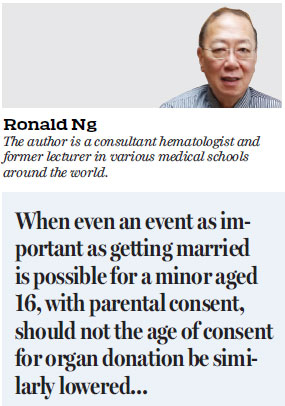Look abroad shows room to maneuver in organ donation
Updated: 2017-04-20 07:03
By Ronald Ng(HK Edition)
|
|||||||||
When one talks of the "age of consent", one usually means the age at which a person is legally considered competent to give consent to sex. The recent case of Tang Kwai-sze, where her daughter - just three months shy of reaching the age of consent for liver donation - was denied the right to donate part of her liver to save her mother's life, highlights the fact that under the eyes of the law, different activities have different ages of consent.
In Hong Kong, the legal age at which a person is allowed to donate part of his/her liver is 18. The usual reasons given are that the donor must be mentally competent enough to appreciate the consequences of donating his/her organ, the voluntariness must be genuine, and finally, he or she must be able to understand the risks involved. How does one know those criteria are met? We all know a person's chronological age does not necessarily correlate with his or her ability to meet those criteria. For bureaucratic ease of administration of the law, the arbitrary age of 18 was chosen.

It might be interesting to know of other countries' practices. In that respect, there are tremendous differences in the way different countries enacted the age of consent for organ donation. In some cases, such as Canada, even within the same country different provinces have different ages of consent. Ontario and Prince Edward Island allow people who are aged 16 and above to donate their organs, while in Alberta, Manitoba, Saskatchewan and Quebec the age is 17. The age of consent in the rest of the provinces is 18. England and Wales do not have a stated lower age limit, while Scotland limits the age to 16 and above. In fact, in a study in 2006, it was shown that a teenager as young as 15 became an organ donor in England.
The website of the Singapore National University Hospital has this to say regarding the age of consent for organ donation: "If you are under 21, you may still be an organ donor, with the consent of your parents. There is also no definite cut-off age for donating organs. The criteria used to assess a suitable donor organ is based on medical criteria and not age." This policy clearly enunciates the principles society should use in deciding whether a person can or cannot donate his/her organ in order to save another's life.
The important question then should be this: What criteria should one use to judge whether a minor is allowed to donate an organ to save another person's life? Obviously, the first and most important criterion is that the risk to the donor is minimal. There is now enough literature to show that in the case of kidney donation, the risk is minimal, though for liver transplant, the risk is higher. Having considered that, it must also be obvious that no other donors are available, either deceased or living, and that the minor has freely decided to donate without coercion from other people. The matter of coercion is particularly important in the case of donating to his or her parent. Some experts have suggested that the minor be interviewed in the absence of any family members by a neutral person in order to ensure there was no familial coercion. Finally, the emotional and psychological risks must be explained to the donor, as well as careful explanation of the surgical and medical risks and complications involved. The ability to understand all that should be tested. These then should be the criteria by which to judge whether a minor is allowed to be an organ donor. Chronological age has only a minor part to play. Perhaps the Hong Kong government could take these into consideration and change the law accordingly.
In Singapore, the number of living kidney donors rose from 184 in 1999 to 477 in 2015, while that from deceased donors rose from 442 to 571 over the same period. The kidney transplant rate in 2015 was roughly 20 per million, compared with Hong Kong's 11 per million. Though the Singapore statistics are better than those of Hong Kong, it is still roughly half the rate of Australia and the United Kingdom. Singapore and Hong Kong share many cultural similarities, so it raises the question whether the difference in rates is due to the different legislative environment. Perhaps Hong Kong could enact similar opt-out legislation where people are considered donors unless they indicate, while still alive, that they would not want to donate organs, as well as enacting a law that makes the age of consent more flexible, subject to the built-in safeguards mentioned above.
When even an event as important as getting married is possible for a minor aged 16, with parental consent, should not the age of consent for organ donation be similarly lowered, if it can be assured that the young donor is of sound and mature mind and understands all the ramifications of the donation?
(HK Edition 04/20/2017 page7)